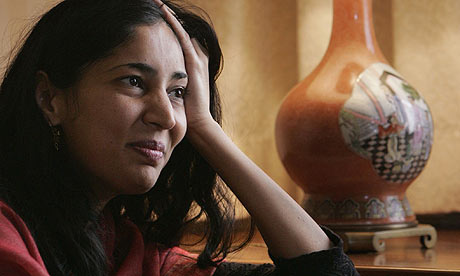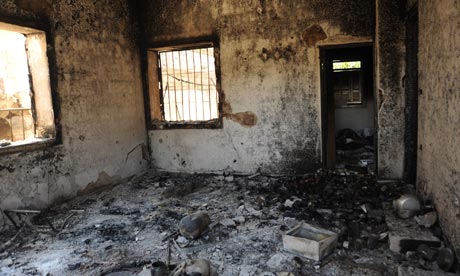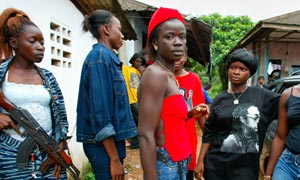When Kiran Desai's Inheritance Of Loss won the 2006 Booker Prize, a few eyebrows were raised. Although she had a famous mother (Anita Desai) who had herself been on the Booker shortlist three times, Kiran was relatively unknown. Comparatively few had read her book, and the bookies had her down at fifth or sixth favourite. So far so normal – Hilary Mantel's victory this year is the first time I can remember a favourite winning. What was unusual that following on from its success the book was subject to protests and book-burning.
Sadly, it wasn't fans of fellow shortlisted author Edward St Aubyn's Mothers' Milk stoking the bonfires, but the outraged residents of Kalimpong. The novel tells of a 1980s rebellion of the ethnic Nepalese in the Himalayan town, who were fed up (in Desai's words) of being "treated like the minority in the place where they were the majority". As the book details, the rebellion was bloody and chaotic. Its fictional portrayal must have hit a raw nerve, especially since Desai herself was, as one man put it at the time, "an outsider" who made the "whole town … strange." She particularly seems to have offended those of Nepalese descent who thought themselves described as little better than thieves and menial fools.
There's perhaps a small grain of truth to these claims. Desai certainly doesn't glorify Kalimpong's non-Indian majority. But the irony is that they get off lightly compared to everyone else. As she teases out her multiple narrative we meet over-privileged Indians who put on absurd English airs; racist, ignorant and distinctly under-intelligent English people; Indians in America who use Gandhi's image to make money while exploiting other Indians; and Indians in America who allow themselves to be exploited. Also, there are the Americans themselves, whose capitalist empire is perhaps the cruellest thing in the book. Nearly every character she focuses on is at some stage degraded and humiliated. Nearly every character also degrades and humiliates others. The "loss" of the title is physical, spiritual, and inescapable.
It is in short a singularly acerbic novel. One that does not win friends by flattery. Even so, it's possible to see why the 2006 judges were won over. Desai's anger, for a start, is a force to be reckoned with. The cold, controlled rage with which she describes – say – an Indian in England watching a countryman take a beating and turn and flee, makes for occasionally heart-stopping reading. The indignation that builds over the course of the book, meanwhile, is overwhelming.
But there are also gentler pleasures. As much as anything this is a descriptive tour de force. There are fine evocations of the clean beauty of the Himalayas, the all-pervading dank of the monsoon, huge crumbling colonial mansions, crammed basements where bed shortages force immigrant labourers to sleep in shifts. Her prose is strong and vivid and generally a delight to read.
I say generally because occasionally Desai steps over the boundary between enjoyably rich and horribly cloying. Take the following, for instance: "a simple blind sea creature, but refusing to be refused … odd: insistent, but cowardly; pleading but pompous." That is how Desai renders a male "organ". There's also a whiff of sixth-form straining for profundity. A man who is blinded disappears "entirely inside the alcohol that has always given him solace". And when a light blows it diminishes "to a filament, tender as Edison's first miracle held between delicate pincers of wire in the glass globe of the bulb".
I also failed to engage with the book's main narratives. The politics and history are fascinating, but I felt dragged along the path Desai weaves through them. I had little sense of urgency or involvement. The central strand relating to the failed love between a privileged Indian girl and her Gorkha tutor, though refreshingly bitter rather than sweet, I found particularly flat. The female half of the equation (Sai) is the one character that Desai allows to escape with any dignity and the only one for whom she pushes any claim for respect and sympathy (rather than pity). Yet she too remained for me unreal, unformed, mildly annoying and largely uninteresting. I didn't care for her travails or anything else. So it was a book I admired rather than liked.
Yet I'm more aware than ever that these are subjective judgements. My basic objection is little more than that the book isn't to my personal taste. But is it to yours? And what else am I missing that the Booker judges saw. All comments will be even more gratefully received than usual, since they'll help inform John Mullan's final column of the month on readers' responses to the book.


















%3Eul.l1d%3Eli%3Anth-child(1)%3Ep.t7%3Ea.related-content-headline&hash=-811204625)
Comments
6 November 2009 11:41AM
This was the one Booker winner from the last decade or so that I haven't read and reading those sentences suggests I did well to give it a wide berth. That said, Sam, this is a good piece that makes me think that I should give it a go.
6 November 2009 11:52AM
Thanks Stuart... I think I'd still recommend reading it. And those sentences were pretty egregious... Most are far better!
6 November 2009 12:46PM
The mid-noughties were a difficult period for the Booker. It seemed as if it was trying and failing to redefine itself. The Line of Beauty was clealry a corker, and I can see why The Sea got it (although it wasn't to my taste). But I, like you, found Desai a mixture of over-written and unremittingly bleak. The portrayal of the judge and his wife is particularly unpleasant. There is an argument to be made that it is fascinating to be given this privileged view into a culture which is so different and set against such a glorious backdrop, but I kept feeling like Desai was there banging a gong to bring this to your attention. Novels should work at a deeper level that merely conveying the "otherness" of their locale. Perhaps this explains the rather strained moments of sixth-form philosophy/sociology. Your piece has made me pick it up anew, however, and I'm interested to see whether I have the same reaction a second time around. Oh, and Mother's Milk not winning was as big a travesty as Sebastian Barry not winning last year.
6 November 2009 12:56PM
@alexpreston: Sebastian Barry?! Surely you mean Linda Grant... But it sounds like I really should read Mother's Milk.
And many thanks for the other comments. Am most glad you agree... and might take up the book again. And you're right about the judge and his wife. That was nasty... Though I didn't think it entirely unjustified. I was quite impressed by the way Desai gradually moved perceptions of the judge... At first he seemed like an almost loveable eccentric... By the end, a beast... I agree about that gong though. It's not generally a book you would accuse of subtlety.
6 November 2009 1:05PM
I really don't get why everyone lined up behind mother's milk. It's all over the place and the 'stylized' prose is as transparently pretentious as they come.
especially awful is the trip to America, loaded with pretty much every single cliche you can imagine.
6 November 2009 1:17PM
Mastershake - I was going to add that both Secret Scripture and Mother's Milk divided opinion violently. I thought Mother's Milk was wonderful despite some of the frankly embarrassing prose. And yes there are some clunking scenes but - and this can be a sign of a dreadful book or a great one - the overall impression left by the novel was far greater than these minor concerns. I do think St. Aubyn is somehow out of step with our time, and like him the better for it.
6 November 2009 2:54PM
I haven't read this yet, but your article makes me want to read it straight away. I think the description of the "male organ" you quoted is great - perhaps it's only men who object to it - is it really the turgid, purple prose you're objecting to, or the unflattering terms such as "pompous", "insistent", "cowardly", etc.!
...I do agree with alexpreston that it was a travesty that Sebastian Barry's "The Secret Scripture" didn't win last year though.
6 November 2009 2:56PM
yeah i do think that some of the scenes in MM were very vivid but overall, not only did the thing feel pointless but the cons outweighed the pros.
6 November 2009 3:16PM
I haven't read it yet myself, but plan to (reading, like you, through all of the Booker Prize-winners). However, I've dawdled in doing so because I've yet to meet a single person who liked The Inheritance of Loss. Most of the people I've known haven't even finished it, so strong were their dislikes. And these are smart folks with great tastes in novels -- each of them found the Desai novel intolerable reading.
6 November 2009 3:35PM
lucylg: Interesting! Maybe it is only men... Though surely, in this case, they are the ones who should know best. Pompous?!
resurgence27: Well, it does seem to be one of the less popular winners. Though, of course, you won't know if you agree until you've tried it. Interesting about your booker trawl! How are you finding it? Any favourites so far?
Meanwhile, am increasingly interested in Mother's Milk.
Would also be very interested to hear from anyone from the area the book is set in... Unlikely I know... But then again, a chap from Leeds Utd did post on the David Peace book club...
6 November 2009 3:46PM
Since I was born and brought up in a town an hour away from Kalimpong, I can attempt to tell you why there was an uproar against this book. Desai completely messed up in her narrative regarding this place. She high-handedly portrayed the local population as creatures without humanity (one example: Sai's tutor beating her up toward the end, which to me was completely unbelievable--there was nothing in the way she built up Gyan's character that would hint he was capable of this, other than her very low opinion of the people of this region). The stereotyping was very colonial of her (as she was all the while supposedly decrying capitalism). She was insensitive in other ways too. The name of a character who was purportedly gay is the name of an actual person of repute in Kalimpong. (Why not be sensitive enough to change the name, if not the profession?) The name of a tailor shop was left intact, while adding the term "Blind" to it. Nepali words that don't exist in Nepali were thrown in for creating an exotic effect I suppose. No other book of recent times has made me so mad as this. And I'm not even Nepalese. And by the way, the author of this article is mistaken when s/he says, "Desai certainly doesn't glorify Kalimpong's non-Indian majority." The population of the Darjeeling district, though often of Nepalese origin and speaking the language Nepali, is as Indian as the rest of India. (Just as Bengali Indians are not Bangladeshi.) It is true that she has skewered everyone else, but she was not a fraction as factually incorrect and insensitive in those cases--for obvious reasons. My conclusion: worst Booker decision ever, period.
6 November 2009 3:57PM
I totally agree with you: I've tried to read this book twice, and both times I never managesd to make it past the first twenty pages. I thought it was just me, but your column reassured me that it isn't! There's just....something about this book that I couldn't get through to.
6 November 2009 4:28PM
Oscar and Lucinda is tops for me. I've read it seven times now. Right behind it, thus far, are Last Orders, True History of the Kelly Gang and The Sea, the Sea.
6 November 2009 4:51PM
Would also be very interested to hear from anyone from the area the book is set in... Unlikely I know...
heh, i thought you meant mother's milk there!
6 November 2009 6:36PM
Posting that paragraph above only seems to have made me want to add to the list of objectionable assaults on truth on Desai?s part. Having lived in the Darjeeling district, I can say that cobras and scorpions are not easily spotted there?which Desai generously piles on to her novel. (I apologize if my memory is spotty and these turn out to be perfectly common.) I distinctly recall that the poisonous snakes endemic to that region are banded kraits and russell vipers. And the cook worshiped two cobras (good exoticization, Ms. Desai), and the police officers were admiringly approving of this, not one of them but all. If that is not an act of pigeonholing people, I don?t know what is.
6 November 2009 6:49PM
Ah, I should be careful what I wish for...
Thanks for a really interesting response though AnanyaB. And for the correction = my mistake. Did the tutor beat Sai up, however? Fascinating about the cobras. Rather a lot was made of those. I suppose it could be defended on the grounds that it was thought rather exceptional that the cook kept them?
Thanks too HIstorypages.
There must be people out there who like the book though... Anyone care to defend it? I know that when I bought it the owner of the very lovely new Book Hive store in Norwich was telling me his Aunt had just read it and loved it...
6 November 2009 6:51PM
Oh and thanks resurgence27 - you seem to be doing them the other way round to me... I haven't go to those ones yet... Wait until you get back to the 1970s. Some real corkers await. And, of course, Midnight's Children before that...
6 November 2009 7:30PM
Sorry, Sam, if my response was so harsh that you'd rather not have wished for it! The beating? I don?t know anymore. Here?s the paragraph: ?But he caught her before she reached him and then threw her aside into the lantana bushes and beat about with a stick.? He may have been beating about the bush I suppose. Possibly my mistake. Sure, keeping the cobras and worshiping them could be defensible on the grounds of artistic license. However for all the police officers to approve of the worshiping? ?The policemen approved of this. ?Pray to them and they will always protect you, they will never bite you.?? That is what I object to. That all the policemen would be take that line. Wouldn?t that safely qualify as denigrating?
6 November 2009 7:37PM
No need to apologise AnanyaB... Your post was bracing and perhaps harsh - but it was definitely also interesting and thought-provoking. I'm grateful to you for putting your point of view so strongly.
And you may be right about the beating. I'd assumed (partly because it was never mentioned again, and possibly because I didn't credit it) that he hadn't hit her... But that could have been a bad reading.
As for the policemen... It's certainly not flattering... But in Desai's defence I'd say again that she hits other targets harder. I don't think she means to imply that any one race or background or type of person is worse than any other... It seems to me that they're all pretty faulty and culpable in her world.
6 November 2009 8:22PM
OK... a broader question: what is the role of plausibility in a work of fiction such as Inheritance of Loss? And would a British author get away with creating a town/village of unbelievably absurd characters (not one or two--but almost all) in a remote but real corner of the UK--forget dotting his or her book with factual errors? I just feel that the great novelists (Tolstoy for instance) highlighted absurdity, but balanced their works with humanity.
6 November 2009 8:41PM
Interesting! I imagine plenty of British writers have... Though none spring to mind immediately... Anyone got any good examples. Philip Henasher's 'The Northern Clemency' is a recent example of a UK book that got a lot of praise for its grasp of history but seemed to me to contain some pretty daft stereotypes (and he was writing about the area he grew up in)...
As for the role of plausibility, I don't know. I guess a big part of it is to do with the suspension of disbelief and stepping outside the story... If you don't notice any faults they aren't a problem... If you do, they are. Is that too glib?
Of course most people in the UK know little about Kalimpong so won't notice if some of the portrayal is 'unrealistic'... and maybe that doesn't matter too much. What's in the book is Desai's ficitonal creation, after all, and certainly I found it generally convincing... But of course, if you know the town well, certain aspects of that fiction will jar with your own experience...
This might not be a particularly relevant example, but it's spring to mind, so I'll bung it down: Thackeray's description of the events surrounding Waterloo in Vanity Fair probably wouldn't correspond closely to the reality as people who were actually there saw it... But that doesn't make it any less impressive as a part of the novel...
6 November 2009 9:01PM
I accede to the points you make. But I reserve the right to not like this book, because, as you put it, "It jars with my own experience."
6 November 2009 11:07PM
I think this is a wonderful book right from the first sentence. The writing is new and interesting, vivid and imaginative. The prose is very poetic. As for claims about accuracy, I don't go to novelists for well balanced evaluations of political situations. How can you when most novels are told from one or two people's perspective? I think novels are inherintly subjective and a writer of fiction is not a journalist.
7 November 2009 12:06AM
I thought it was a terrific book, thoroughly engaging, and I had approached it not expecting to like it at all (because I feared Anita's influence LOL).
See http://wp.me/phTIP-l7
Lisa Hill, ANZ LitLovers
7 November 2009 3:18AM
I started it but didn't finish it - normally I like novels about India, but just didn't get into this one.
2006 also had Kate Grenville's The Secret River shortlisted, which I consider to be a fantastic novel.
7 November 2009 3:49AM
I was delighted to read Olive27's comments and to find, at last, someone else among the commenters here who loved the book. The writing is rich, dense, evocative, the interwoven structure of the novel complex, its scope ambitious. I can say that about very few contemporary novels, most of which seem to me incredibly shallow.
As for the accuracy issue -- this is a naive reading of fiction. Of course novels are one writer's imaginative take on a place and set of characters. Moreover, on might ask just how "realistic" Desai's novel is intended to be. At times it's quite satiric and over the top. In the end it is the imaginative act that literature -- good literature -- always is. Novels are always bending "reality" to the needs of their specific story. I think there's almost a wilful misreading of tone here, an all-too-ready eagerness to be indignant and offended. Desai's book is indeed dark, beginning and ending with the lofty, indifferent Himalayas that are the backdrop here to the pettiness of human drama. So what? Shouldn't literature be "an axe to break the frozen sea within us," as Kafka famously said? Give me something bracing and demanding any day against the cultural vacuity that envelops us!
7 November 2009 4:55AM
olive 27 and patrizianorth, yes writers of fiction are not journalists. And they are writing fiction, which is invented, but when they place their fictions in a time and place, the question arises, how free are they to take liberties with facts? Isn't there a line? If I were to setting my novel in Florida and described the Grand Canyon as part of Florida, wouldn't people question that? I'm giving this extreme example only to try to highlight what I'm saying. Of course in a magic realism novel or experimental novel something like that might even work. But I don't think Inheritance of Loss, even if over the top, is non-realistic, in the sense that I feel it is attempting to be a realistic portrayal of a real insurgency, which serves as the background.
However I agree that all of you have a point. Because in addition to Sam's example of the Waterloo scene in Vanity Fair, I was reading Nabokov's take on Russian literature where he mentions that Tolstoy was not absolutely faithful to reality.... So...
Perhaps it's just the degree. Or perhaps I'm completely mistaken.
I apologize for my indignation and eagerness to be offended. Usually I'm rarely indignant about literary matters. But this hit me too close to the heart.
7 November 2009 8:33AM
Please don't apologise AnanyaB, your posts have been splendid. You've made this discussion really interesting... I may not agree with everything you've said, but I' glad you're here and speaking from the heart,as you say. Interesting about Nabakov too.
Meanwhile, thanks also for the more positive comments olive27, gunung and PatriziaNorth ... I especially like Kafka's axe to break the frozen sea within us... I guess you could say Desai's own axe is good and sharp.
More please!
Thanks too kiwireader... Interesting that this also seems to be a book quite a few people don't want to finish.
7 November 2009 7:05PM
I also was rather relieved to discover that somebody else admired but didn't enjoy this book. The writing is magnificent in parts and the passion behind it impressive. But it disgusts and excites and amuses without moving one, and I wonder if this is because the characters are, at bottom unbelievable and unsympathetic - I mean I can't sympathise with them. I don't need to like them, but I can't engage with them because they are neither human nor (sufficently) magnificent caricatures -in fact the tone is uncertain, wobbling between the high fantasy of magic realism and the super-realism of say, A Suitable Boy.
AnanyaB's comments are especially intersting because, for many of us, for whom the setting is completely exotic and unknown, it is salutary to be reminded that Desai is writing about a real place and it appears in some cases, real people (I did wonder whether the real name she uses might have been co-incidence?).
But I did finish it. And I finished Mother's Milk - which was very odd too - and much less memorable - meaning that I have no recollection of it, which may say more about me than about the book - but I can remember whole scenes from Inheritance of Loss, which may not be an unadulterated pleasure but is perhaps an indication of quality. Whereas I have not finished The White Tiger, which has been sitting reproachfully on my bedside table since last Christmas. Can anyone tell me why I should?
8 November 2009 9:52PM
would a British author get away with creating a town/village of unbelievably absurd characters (not one or two--but almost all) in a remote but real corner of the UK
Zadie Smith managed it with Boston in On Beauty!
And Andrew O'Hagan in Be Near Me, though perhaps 'unbelievably absurd' is a bit too unkind in that case since although the characters were a bit daftly drawn they weren't actually absurd, unliek those in On Beauty.
9 November 2009 1:14AM
Lamentable
Behind my cottage there was an olive grove
someone came knocked down the trees for
a better view, but it wasn?t true they built
four thousand dwellings instead and called
it a security zone. And then they built a wall
so I can?t see my lost olive grove.
The world agree with me this is all wrong,
but tells me I, for the sake of peace, must
understand and give way. I have understood
for sixty years and given way so many times,
and I know now I made a mistake to let their
cattle graze on our common land
9 November 2009 11:23AM
It's on my shelf, but I've not read it yet I have to admit. Something about it never quite entices me enough, though I'm sure I'll read it eventually.
Incidentally Sam, not sure men are best placed to know on the description front, barring gay men of course, the description is from the point of view of someone watching it approaching after all.
The accuracy thing is interesting, David Peace comes to mind here. His stuff is steeped in time and place, feels historical, but actually it's not necessarily particularly true. The difficulty is, it feels true, so the reality is swamped by the fiction. That may happen here too, not having read it yet I can't for certain say.
If everyone's a caricature though, that smacks of satire, and the fact those we know are rendered absurd perhaps should suggest those we don't know are rendered just as absurdly, and that we can't therefore take it as an honest account. Satire often involves distortion after all, exaggeration.
AnanyaB, I think we should all reserve the right not to like stuff, however well others may regard it. Anything else would be dishonest anyway. I thought your posts very interesting.
9 November 2009 1:54PM
Ah, internet joy! Posts from the Himalayas, a poem about Palestine, posts about the importance of setting in literature, posts about descriptions of the male member... how splendid! Thanks to all.
On the organ question MzxC, it was from the judge's POV and he's a chap... Although I agree that it would be great if a gay man familiar with the passage in the novel could provide the definitive answer on pomposity of erections and co. Anyone able to supply?
Meanwhile, I think the David Peace analogy is a good one MaxC... I'd say Desai's version of the reality is perfectly legitimate (and worthwhile) within the bounds of her fiction... But it's not entirely surprising that it might upset some people in 'reality'.
Serenissima, thanks for a really interesting post... The characters do occupy an uneasy space between caricature and fullness... But perhaps that's deliberate. I thought it was interesting how Desai never let us feel too intimate with any... But did allow real glimpses into their humanity... as well as making them larger than life... not sure where this is heading, but still... interesting.
As for The White Tiger... I quite enjoyed that. But if the first 50 pages haven't done it for you, I don't think the rest will either. The tone doesn't change too much.
9 November 2009 2:39PM
peace is doing soemthing different, surely? the whole idea behind almost every single one of his novels is to produce a 'folk historical' version of history, which might not be all that accurate factually but exposes the fictional nature of the 'real' history (ie cloughie as loveable rogue instead of alcoholic, workaholic aresehole) and gives the 'unrepresented' the chance to be represented.
That links it to postcolonial writing but i'm not sure the analogy is all that straightforward with Desai.
9 November 2009 3:12PM
The point with the Peace comparison was about the problems of fiction which appears convincingly realistic, but which in fact is not bound by reality. There's a risk of the fiction becoming the reality, in the reader's mind.
Peace has had a few complaints about that, as Desai was here.
He is doing something different (as best I can tell not having read Desai yet), but from the point of view of that particular issue - the accuracy of the fiction, I think through different routes and with different objectives they run into the same problem. A sufficiently realistic air can lead readers to make assumptions about the factual nature of the work that actually aren't being asserted by the author.
If I write a novel set in Zagnor, where the Jade Council is being threatened by the Witch-Lords, it's pretty obvious I've made it all up. If I set it Amsterdam between 1938 and 1940, my novel may be equally fictional but people's expectations will be of something more grounded in fact. I'm not sure how fair those expectations are, but if like Peace my notional Amsterdam novel is actually pretty persuasive but in fact isn't particularly accurate some folk will end up feeling misled or misrepresented.
On an unrelated note, much better photo Sam. The old one always made me nervous you were the vanguard of a zombie apocalypse, with this one I feel if I met you I wouldn't need to wear a helmet to avoid you eating my brains.
Pechorin's Journal
9 November 2009 4:05PM
I am halfway through the book in question but put it aside six months ago fully intending to finish it, rather than giving up on it. Despite taking a break from it, I admire her use of language and came away from my half-reading with a real desire to write as well as she does. To bring characters and situations to light in such vivid and memorable ways. I agree that it's pretty harsh in places and particularly not convinced by the Sai love interest aspect. But I found the judge a great character and the fate of the cook's son in the US had me filled with dread. All in all quite charged and infinitely better than The Blind Assassin (I truly gave up on that one). I also think it stands apart from the pack pretty well. I remember the excitement I felt on reading the first few pages and realising: oh great, at last, some really good writing.
11 November 2009 8:40AM
Also gave up halfway. Most disapointing as everything about the book -- subject matter, location, award -- had drawn me to it. An air of sixth form self consciousness plus political correctness pervaded.
11 November 2009 10:36AM
It's a tricky question, as these threads have hashed out with respect to Peace, among plenty of others.
The salient rejoinder, Max, would be: how "fair" would it be if the novel set in '38-'40 Amsterdam featured the Dutch escape hatch of an 'underground' that saves the lives of hundreds of thousands of German and Slavic Jews?
History, as a genre of writing, has the 'fair expectation' of methodologically and empirically verifiable fact, within the ambit of some undefinable consensus, or a compelling challenge to those facts / that consensus.
You could argue that "history" is really nothing other than a kind of fiction. This relativization seems to me both untruthful and, except for nefarious purposes, inutile.
11 November 2009 11:49AM
It's a good challenge deadgod, I think my answer would be that there is (or should be anyway) a difference between a work that purports to be fiction and a work that purports to be history.
That's partly why I'm hostile to the trend of putting fictional snippets in history books, italicised sections showing the thoughts of historical figures, we don't know what they thought, only what was recorded (and that we often can't trust).
In fiction, I think there is an obligation if it's a work of historical fiction or a work set in a distant and unfamiliar locale to try to get the facts right, but in fiction I think with sufficient talent all obligations can be ignored. It'sjust dangerous to assume you have that talent if you're writing a book yourself. Peace, for all his faults, knows the rules he is breaking and his talent I think justifies the breach. Desai, well, the jury's out isn't it?
11 November 2009 5:30PM
MaxCairnduff and Serenissima, thanks for your supportive statements.
Any writer who bases their story within the context of a historical event would probably shape the event to better suit his/her literary needs. For example, Shakespeare, I think, changed the chronology of events in Henry VI for artistic reasons. The question that is pertinent here I think is, what is the reason behind the author's misrepresentation? If there's a gap in the writer's knowledge due to historical distance which she fills by way of guesswork, that's of course OK. It's OK to do the same to make your work more poignant, artistic, resonant, etc as well I feel. But if the reason behind the misrepresentation is apathy/indifference (and doesn't make the quality of the writing better) then what? The sheer scale of the license in this case is stunning... coconut triangles are not sold on route to Kalimpong... it's too far from the coast; Mt. Everest cannot be spotted from the town of Darjeeling (you have to travel to a couple of places nearby), etc... I could go on and on.
The other related question I can think of to ask is, who is the ideal reader for Kiran Desai? It's more possibly the Western reader to whom such misrepresentations wouldn't matter, rather than someone living in Kalimpong. If the latter were the case, she wouldn't have done what she did. Is that wrong? I guess not. It's just that I think it is understandable why the book is not liked there. Of course I do not agree with the book burnings and extreme comments made against her.
Sam, I'm not posting from the Himalayas, alas--where I lived for the first 16 years of my life. Just from the somewhat more prosaic suburbs of Washington DC.
12 November 2009 9:55AM
Thanks again AnanyaB... That's a very interesting question about the audience. And whether indeed it matters. Anyone got any thoughts?
(And you're still familiar with the region, which is impressive to me, Washington DC or not)
Meanwhile MaxC and deadgod... that is a good challenge. Thanks - as ever - for creating such an interesting discussion (oh and you too mastershake..)
catyhcentral and dravot... Also thanks. Interesting posts too. I'm really intrigued that so many people have posted that they didn't finish the book... Clearly it doesn't resonate emotionally with quite a few readers... Myself included, although I was glad I went the distance. There is some interest in the finale!